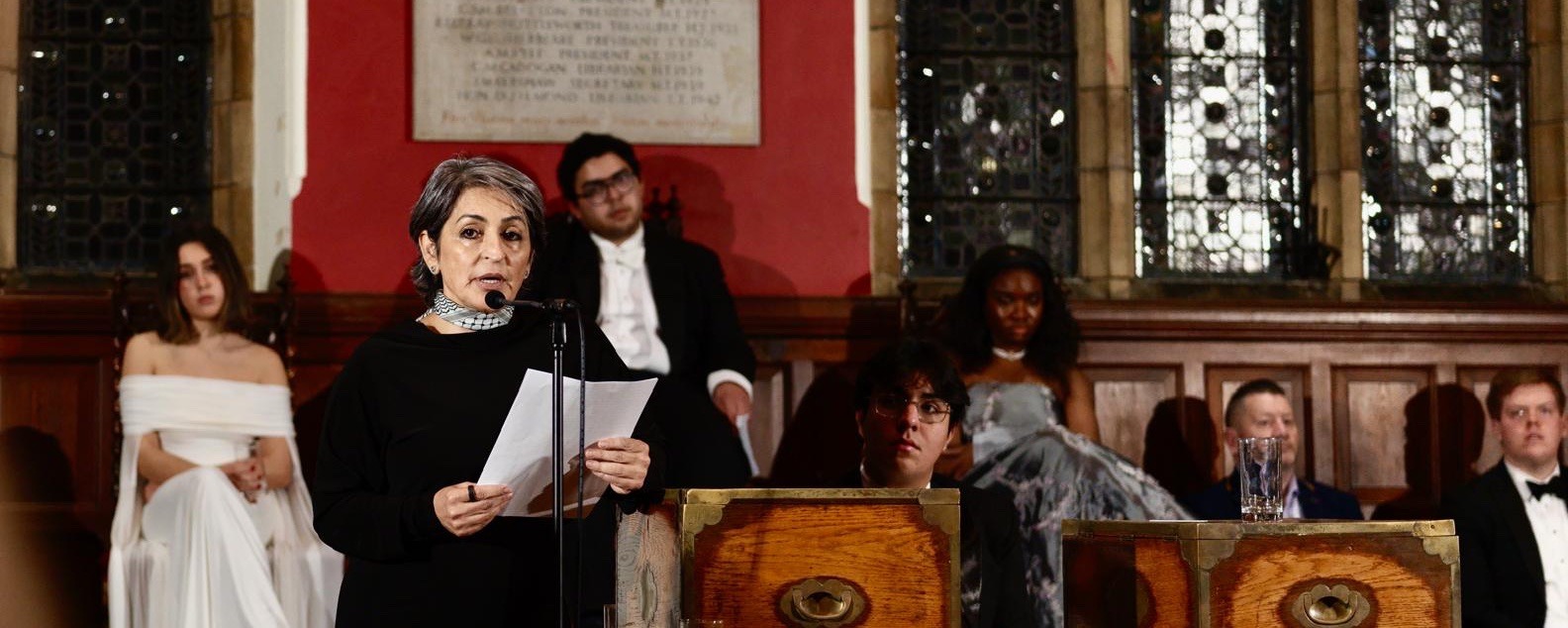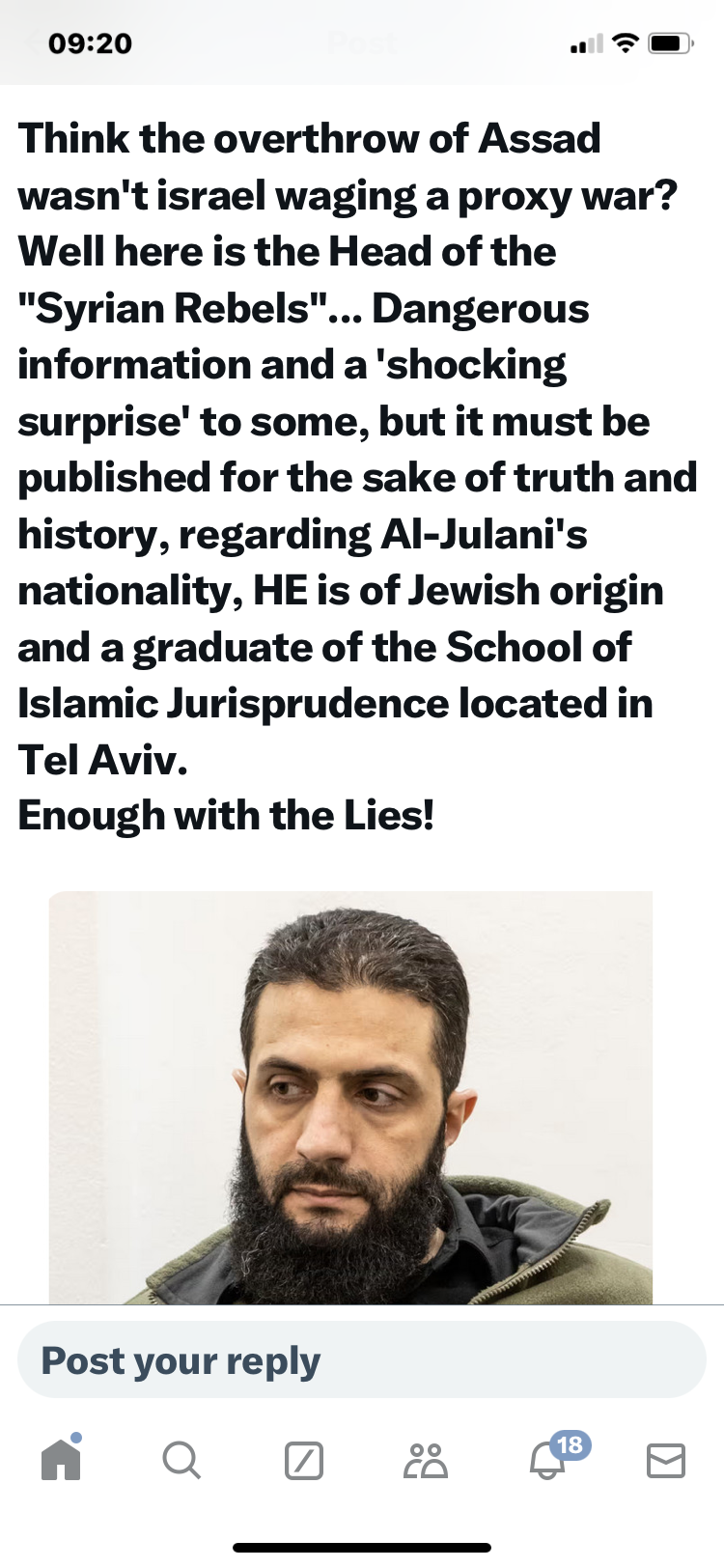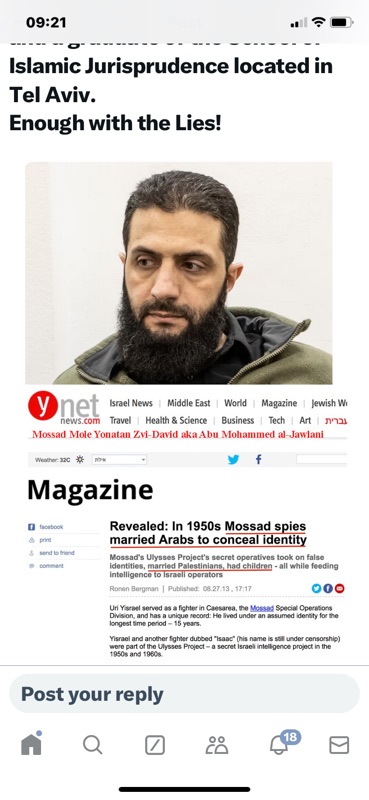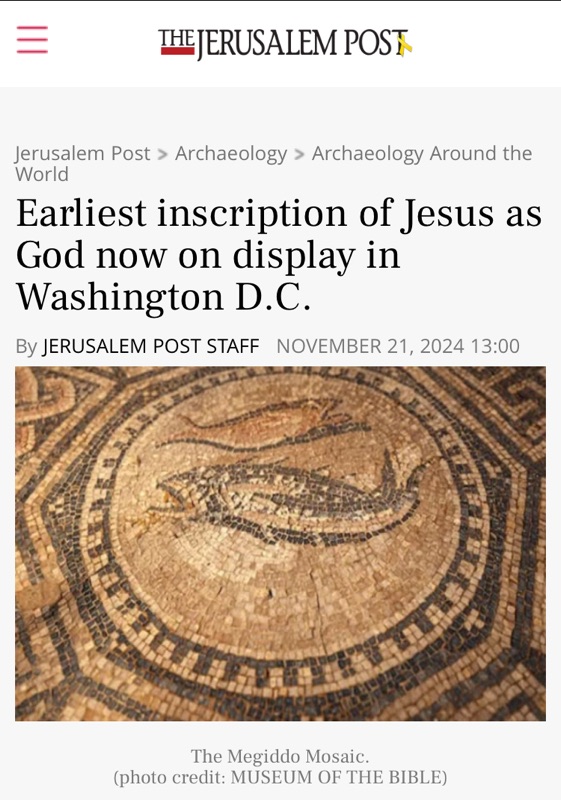https://www.facebook.com/share/v/15PQTNmVZ4/?mibextid=wwXIfr
seconds: Million 0.0328 years; Billion 31.7 years; Trillion 31,710 years
Visit USADebtClock.com to learn more!
Sunday, December 29, 2024
Israel has a right to self defense, but not against an oppressed people it is occupying!
https://youtube.com/shorts/ApnKGxawGfE?si=c_zA0ahe03cMlAwy
Monday, December 23, 2024
Sunday, December 22, 2024
Thursday, December 19, 2024
Psalm 7:9 (KJV) Oh let the wickedness of the wicked come to an end… Mark 4:23 (KJV) If any man have ears to hear, let him hear.
https://youtu.be/0SZj9A_Hnbg?si=EcXNJU2REbkSUol9
Wednesday, December 18, 2024
Genocide Has Been Live Streaming For Over a Year So There Is No Excuse!
https://youtu.be/Xd6bM0ETG-I?si=xpWtTxzozHXiW-W8
Tuesday, December 17, 2024
Monday, December 16, 2024
6,000,000 Six Million
The # 6 million is Jewish gematria.
Long story short, Chabad (Global Jewry) kept pushing the 6 million figure to convince the masses prophecies came true and it's time to rebuild #Israel. Hence, why you hear the talk about the Messiah non stop, blowing up Al Aqsa. Jews get 2800 slaves each too.
https://x.com/mosababutoha/status/1868393664525000933?s=46
Thursday, December 12, 2024
Wednesday, December 11, 2024
God saved us from God’s chosen people!
youtu.be/PD5gtM1A990?si=xv2jKsZYK0FGyfuU
usslibertyveterans.org
10/7
Nine Minutes Of Testimonies From Both Israeli Soldiers And Civilians Explaining How The IDF Killed Their Own People On October 7.
“What we saw here was a Mass Hannibal.”
🔗SOURCE ➡️ Censored Men
10/27 — Shin Bet Warned Of Possible Hamas Assault Hours Before October 7 Attack
10/13 — Haaretz: Netanyahu's Government Is Sidelining A Hostage Deal While Eyeing Gaza Annexation, Israeli Defense Officials Say
7/8 — Report Confirms Israel Ordered ‘Hannibal Directive’ During October 7 Response [Haaretz]
6/14 — UN Finds at Least 14 Israelis Likely Intentionally Killed by Own Army on 7 October
6/6 - Was October 7th Allowed to Happen To Further The Greater Israel Agenda? Did The Hannibal Directive Ever End? [X]— Part 4 of @PsyopDaily's / TheMcgwire's Oct 7th Series
Follow➡️ @PsyopDaily
Sunday, December 8, 2024
Bold Christian convert from Islam preaches Jesus to Muslims in GB!
https://youtu.be/oM7I7wAVfxc?si=31XpGbxhX_umiazk
Saturday, December 7, 2024
Israeli historian produces vast database of war crimes in Gaza
Thursday, December 5, 2024
Jerusalem, We Have A Problem: Armagedon, The Millenial Reign, And Gog and Magog!
I'm not a prophet, a Bible scholar, an ordained preacher or teacher, merely a Christian. I am not dogmatic about this, I just wonder.
Our pastors and teachers were brought up in Bible schools/colleges that had already been infiltrated by Satan’s minions.
JN Darby originated ‘dispensationalism’ and the ‘secret rapture’ of the church. Scofield (the ‘father of Christian Zionism’) mainstreamed those views and is the father of Christian Zionism. In his Scofield Notes he created a new sin; antisemitism!
Hal Lindsey drew from the Jesuit Francisco Ribera who the pope had commissioned to come up with an eschatological interpretation (futurism) of the ‘whore of Babylon’ that would place her in the distant future. He also commissioned Spanish Jesuit Luis De Alcazar to come up with an interpretation (preterism) that put her in the distant past. He did this because of the reformation and the printing press.
People were now allowed to read the Bible and the printing press made it more available to people who would immediately identify the papacy as the ‘whore of Babylon’! There is soooo much that we weren’t taught that was hidden by the Catholic Church (the Dark Ages was an invention of the Catholic Church) and later by the infiltration into Christian schools, colleges, and pulpits!
Is our history a Roman Catholic/Jewish-Kaballah Talmud deception? Could the millennial reign of Christ have already happened? Are we in that little while when Satan is released after the 1,000 year millennial reign? Rev 20:3
What about Daniel's seventy weeks wasn't fulfilled with Jesus' birth, baptism, death, ressurectiom, and ascension? Looks to me that they all were! Dan 9:24 Seventy weeks are determined upon thy people and upon thy holy city, to finish the transgression, and to make an end of sins, and to make reconciliation for iniquity, and to bring in everlasting righteousness, and to seal up the vision and prophecy, and to anoint the most Holy.
These New Teatament verses were written some 2,000 years ago! Yet they all appear to state plainly that 2,000 years ago it was the last hour, the end of all things was at hand, things would soon take place/come to pass. Are we still, 2,000 years later, awaiting their fulfillment?
The kingdom is apparently not the final state! Not what we normally think of as heaven. You enter the kingdom of heaven when you get saved.
Matt 3:2 "Repent, for the kingdom of heaven is at hand.”
Jn 18:36 Jesus answered, “My kingdom is not of this world/age..."
Mark 4:30 And he (Jesus) said, “With what can we compare the kingdom of God, or what parable shall we use for it?
Matt 10:23 "...truly, I say to you, you will not have gone through all the towns of Israel before the Son of Man comes."
1 Pet 4:7 "The end of all things is at hand..."
1 Jn 2:18 Children, it is the last hour, and as you have heard that antichrist is coming, so now many antichrists have come. Therefore we know that it is the last hour.
Rev 1:1 The revelation of Jesus Christ, which God gave him to show to his servants the things that must soon take place...
Jesus the Prophet Verily I say unto you, This generation shall not pass, till all these things be fulfilled.
Matt 24:34 But when they persecute you in this city, flee ye into another: for verily I say unto you, Ye shall not have gone over the cities of Israel, till the Son of man be come.
Matt 10:23 Assuredly, I say to you, there are some standing here who shall not taste death till they see the Son of Man coming in His kingdom.”
Matt 18:28 21 When Peter saw him, he asked, “Lord, what about him?” 22 Jesus answered, “If I want him to remain until I return, what is that to you? You follow Me!” 23 Because of this, the rumor spread among the brothers that this disciple would not die. However, Jesus did not say that he would not die, but only, “If I want him to remain until I return, what is that to you?”…
John 21 Note: Haydock Catholic Bible Mommentary: "Others refer these words of Christ to his coming to destroy Jerusalem: an epoch which St. John survived." Jesus answered. “But I say to all of you, from now on you will see the Son of Man sitting at the right hand of Power and coming on the clouds of heaven.” Matt 24:64 8
Be ye also patient; stablish your hearts: for the coming of the Lord draweth nigh. 9 Grudge not one against another, brethren, lest ye be condemned: behold, the judge standeth before the door. James 5
The Revelation of Jesus Christ, which God gave unto him, to shew unto his servants things which must shortly come to pass; Rev 1:1
The Destruction of Jerusalem Josephus: Besides these, a few days after that feast [of the unleavened bread], on the twenty first day of the month of Artemisius, a certain prodigious and incredible phenomenon appeared: I suppose the account of it would seem to be a fable, were it not related by those that saw it, and were not the events that followed it [the destruction of the temple in 70] of so considerable a nature as to deserve such signals; for, before sun-setting, chariots and troops of soldiers in their armour were seen running about among the clouds, and surrounding the cities (6,5,3) There had been seen hosts joining battle in the skies, the fiery gleam of arms, the temple illuminated by a sudden radiance from the clouds. The doors of the inner shrine were suddenly thrown open, and a voice of more than mortal tone was heard to cry that the Gods [sic!] were departing. At the same instant there was a mighty stir as of departure.
I often hear people using news reports about Middle Eastern events to suggest that the battle of Gog and Magog is at hand. Here's a news flash -- the battle of Gog and Magog happen after Christs' millenial reign, not before!
Rev 20:7 And when the thousand years are expired, Satan shall be loosed out of his prison, 8 And shall go out to deceive the nations which are in the four quarters of the earth, Gog and Magog, to gather them together to battle:...
Wednesday, December 4, 2024
Tuesday, December 3, 2024
Zionism!
Washington Post highlights thousands of clips by IDF troops showing apparent violations of international law
By LAZAR BERMAN
FOLLOW
3 Dec 2024, 5:46 pm
Israeli soldiers drive past destroyed buildings in Rafah in the Gaza Strip on September 13, 2024 (Sharon ARONOWICZ / AFP)
The Washington Post publishes an in-depth investigation into videos posted by Israeli reservists during 14 months of war that show actions and behavior that could violate both IDF orders and international law.
“Videos and photographs have repeatedly shown [IDF] forces demolishing entire buildings, including homes and schools, as well as looting and torching them,” says the report. “Other visuals have Israeli soldiers posing next to dead bodies and calling for the extermination and expulsion of Palestinians.”
The outlet says it has viewed thousands of videos posted by IDF soldiers, “a vast cache that gives a rare and troubling view of how some elements of the Israeli military have conducted themselves” throughout the war.
Promoted: Sheba Global, Dr. Ben BoursiKeep WatchingTel Aviv Cafe brews resilience00:00/02:12
The Post also interviews IDF reservists who say they felt there was a sense of revenge motivating many of their comrades in Gaza.
Some of the videos make light of the destruction of civilian homes, which military necessity could justify in a range of scenarios in urban combat. Other videos show reservists filming Palestinian corpses in footage meant to be humorous or show a desire for revenge.
Israeli military ethicist Asa Kasher calls the phenomenon “a breakdown of not just military discipline, but a break in understanding what it takes to represent the IDF and Israel.”
The IDF says disciplinary talks have been held with some of the soldiers involved in incidents that “deviated from IDF values and principles and contradicted regulations.” It also says that if criminal conduct is involved, the military police are called in.
In February, IDF Chief of Staff Lt. Gen. Herzi Halevi sent a missive to troops, instructing them that the army is “not on a killing spree,” not acting out of revenge and not carrying out genocide in the Gaza Strip.
“We act like human beings and, unlike our enemy, maintain our humanity. We must be careful not to use force where it is not required, to distinguish between a terrorist and those who are not, not to take anything that is not ours — a souvenir or weapons — and not to film revenge videos,” Halevi said.
The IDF chief’s comments came weeks after The New York Times published its own article, “What Israeli Soldiers’ Videos Reveal: Cheering Destruction and Mocking Gazans,” which showed photos and videos of Israeli soldiers making derogatory comments about Palestinians, vandalizing civilian property and smiling for the cameras while driving bulldozers and using explosives.
https://www.timesofisrael.com/liveblog_entry/washington-post-highlights-clips-by-idf-troops-showing-apparent-violations-of-international-law/
Monday, December 2, 2024
Sunday, December 1, 2024
Zionism Revealed by Susan Abulhawa

Palestinian Activist Delivers Poignant Speech at Oxford Union, Calls for Justice and Liberation
In a profoundly moving and meticulously crafted address, Palestinian author and human rights activist Susan Abulhawa captivated the Oxford Union during Thursday’s debate on the motion: “This House Believes Israel Is an Apartheid State Responsible for Genocide.” The motion passed with overwhelming support, 278 votes to 59, but it was Abulhawa’s speech that resonated deeply, leaving the audience in stunned silence.
Abulhawa, the daughter of Palestinians displaced during the 1967 war and the founder of the NGO Playgrounds for Palestine, laid bare the historical and ongoing struggles of her people under Israeli occupation. Her speech, delivered with calm yet unyielding resolve, painted a stark picture of Palestinian suffering and resilience.
Below is Susan Abulhawa’s Speech at the Oxford Union:
“Addressing the challenge of what to do about the indigenous inhabitants of the land, Heim Weizmann, a Russian Jew, said to the World Zionist Congress in 1921 that the Palestinians were akin to the rocks of Judea—obstacles that had to be cleared on a difficult path. David Ben-Gurion, a Polish Jew who changed his name to sound relevant to the region, said, ‘We must expel Arabs and take their places.’
There are thousands of such conversations amongst early Zionists who plotted and implemented the violent colonization of Palestine and the annihilation of her native people. But they were only partially successful, murdering or ethnically cleansing 80% of Palestinians, which meant that 20% of us remained an enduring obstacle to their colonial fantasies.
Zionists lamented our presence and debated publicly in all circles—political, academic, social, and cultural—regarding what to do with us, what to do about the Palestinian birthright, about our babies, which they dubbed a demographic threat. Benny Morris once expressed regret that Ben-Gurion did not finish the job of getting rid of us all, which would have obviated what they referred to as the ‘Arab problem.’ Benjamin Netanyahu once bemoaned a missed opportunity during the 1989 Tiananmen Square uprising to expel large swaths of the Palestinian population while the world’s attention was focused on China.
Some of their articulated solutions to the nuisance of our existence included the ‘break their bones’ policy in the 1980s and 1990s, ordered by Yitzhak Rabin. That horrific policy, which crippled generations of Palestinians, did not succeed in making us leave. Frustrated by Palestinian resilience, a new discourse arose, especially after a massive natural gas field was discovered off the coast of northern Gaza worth trillions of dollars. This new discourse is echoed in the words of Colonel Efraim Eitan, who said in 2004, ‘We have to kill them all.’
Aaron Sofer, an Israeli so-called intellectual and political adviser, insisted in 2018 that ‘we have to kill and kill and kill, all day, every day.’ When I was in Gaza, I saw a little boy, no more than nine years old, whose hands and part of his face had been blown off from a booby-trapped can of food the soldiers had left behind for Gaza’s starving children. I later learned that they had also left poison food for people in Shuja’iyya and booby-trapped toys in southern Lebanon.
The harm they do is diabolical, and yet they expect you to believe they are the victims, invoking Europe’s Holocaust and screaming ‘anti-Semitism.’ They expect you to suspend fundamental human reason to believe that the daily sniping of children with so-called ‘kill shots’ and the bombing of entire neighborhoods that bury families alive is self-defense.
They want you to believe that a man who had not eaten a thing in over 72 hours, who kept fighting even when all he had was one functioning arm, was motivated by some innate savagery or irrational hatred, rather than the indomitable yearning to see his people free in their own homeland.
It’s clear to me that we’re not here to debate whether Israel is an apartheid or genocidal state. This debate is ultimately about the worth of Palestinian lives—about the worth of our schools, research centers, books, art, and dreams. It is about the worth of our homes, which contain the memories of generations, and the worth of our humanity and agency.
If the roles were reversed—if Palestinians had spent the last eight decades stealing Jewish homes, expelling, oppressing, imprisoning, poisoning, torturing, raping, and killing them—there would be no debate about whether that constituted terrorism or genocide.
Yet here we are, enduring the indignity of debating those who think our only life choices should be to leave our homeland, submit to their supremacy, or die politely and quietly.
But you would be wrong to think that I came to convince you of anything. This house resolution, though well-meaning and appreciated, is of little consequence in the midst of this Holocaust of our time. I came in the spirit of Malcolm X and James Baldwin, both of whom stood here and in Cambridge before I was born, facing finely dressed, well-spoken monsters who harbor the same supremacist ideologies of Zionism.
I’m here for the sake of history—to speak to generations not yet born and for the chronicles of this extraordinary time, where the carpet bombing of defenseless indigenous societies is legitimized. I’m here for my grandmothers, both of whom died as penniless refugees while foreign Jews lived in their stolen homes.
I also came to speak directly to Zionists, here and everywhere. We let you into our homes when your own countries tried to murder you and everyone else turned away. We fed, clothed, and sheltered you. And when the time was ripe, you kicked us out of our own homes and homeland, then killed and robbed and burned and looted our lives. You carved out our hearts because it is clear you do not know how to live in the world without dominating others.
No matter what happens from here, no matter what fairy tales you tell yourself and tell the world, you will never truly belong to that land. You will never understand the sacredness of the olive trees, which you’ve been cutting down and burning for decades just to spite us and break our hearts a little more. You will not erase us, no matter how many of us you kill all day, every day. We are not the rocks that Heim Weizmann thought you could clear from the land. We are its very soil. We are her rivers and her trees and her stories.
Someday, your impunity and arrogance will end. Palestine will be free. She will be restored to her multi-religious, multi-ethnic, pluralistic glory. We will restore and expand the trains that run from Cairo to Gaza to Jerusalem, Haifa, Tripoli, Beirut, Damascus, Amman, and beyond. You will either leave, or you will finally learn to live with others as equals.”
Abulhawa’s address not only emphasized the enduring spirit of the Palestinian people but also called attention to the systemic violence and dispossession that have defined their plight. She concluded by expressing hope for a future where justice prevails and Palestine is restored as a beacon of pluralism and peace.
Her speech at the Oxford Union is already being hailed as a pivotal moment, a searing testament to the Palestinian struggle and a call to the global conscience to act against injustice.



 https://x.com/voxexveritas/status/1866381378683564514?s=46
https://x.com/voxexveritas/status/1866381378683564514?s=46

 https://www.facebook.com/share/14xAqif8Mj/?mibextid=WC7FNe
https://www.facebook.com/share/14xAqif8Mj/?mibextid=WC7FNe